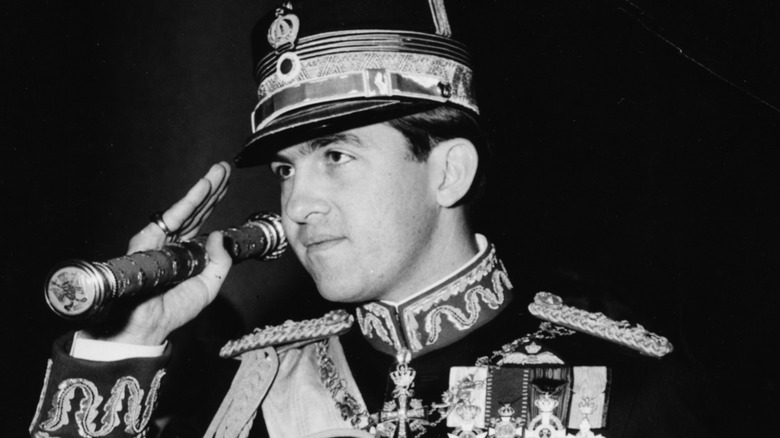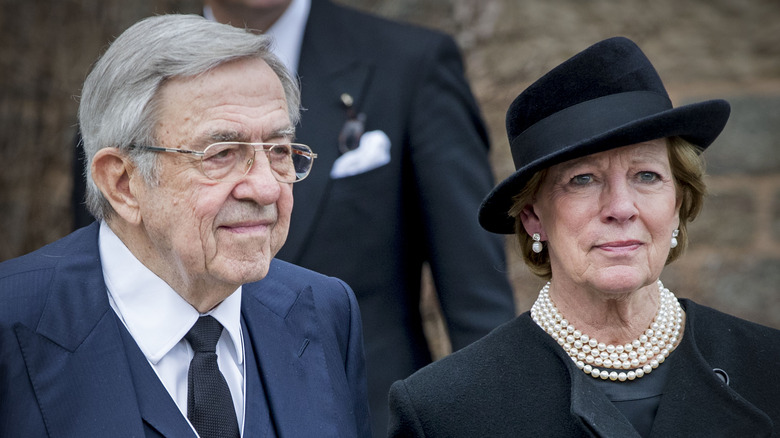Why Constantine II, The Last King Of Greece, Was In Exile For More Than 50 Years
A few European countries still retain their centuries-old monarchies, including the United Kingdom and the Netherlands, among others. Others have gotten rid of their monarchies over the centuries, ditching the ancient form of governance, which is largely symbolic by this point anyway. Greece, for its part, got rid of its monarchy in 1973, according to NBC News. However, the man who held the title of king at the time was a young man, and he lived for the next several decades, effectively as a king without a country. Constantine II (above) passed away on January 10, 2023, as People reports.
During the decades he spent in exile, Constantine had a contentious relationship with his homeland, as The Guardian reports, often clashing with the country's government over his possessions and other matters. Though stripped of his citizenship, he was allowed to return, apparently having been motivated by poverty (although here the term "poverty" is used in relative terms).
What did Constantine II do to deserve such a plight? Long story short, he picked the wrong side during a civil war.
Constantine II is Deposed
Nobody gets to pick when they're born, but Constantine II, had it been possible, could have done a lot better. As The Guardian reports, he was just a baby (and not yet king) when World War II came calling, and he and his family were forced into exile in Egypt and South Africa. His family returned after the war, and the monarchy resumed its reign; Constantine II would become king on the death of his father in 1964.
The timing was atrocious. Greece was effectively a pawn by this point, with the United States and the Soviet Union both keenly interested in the country as an anchor for its own influence in Europe and the Mediterranean. In 1967, right-wing military leaders staged a coup against the country's government, which had been heading toward the left. Constantine appeared to support the military junta, though later he would suggest that he had no choice as the palace was surrounded by tanks; rumors would also suggest he was "encouraged" to support the right-wing elements by the U.S. He then attempted — and failed — to stage a counter-coup, and when the dust had settled, he found himself no longer welcome in the country where he had once been king. He was forced into exile and fled to Rome.
Decades In Exile
By 1973, Constantine II had become persona non grata in his homeland and was living in exile (via Associated Press). Further still, the people voted in that year to permanently abolish the monarchy, putting an end to Constantine's hopes of ever reigning again.
His relationship with his homeland was contentious, to put it mildly. According to The Guardian, he returned in 1981 to bury his mother and again in 1993 in an attempt at a vacation, only to find that Greek naval vessels and aircraft took a keen interest in his yacht and wouldn't leave him alone. His former country also insisted that he was a regular person and demanded he take a last name, something that he literally did not have. And as an added insult, the Greek government took possession of basically everything that belonged to the monarchy, and Constantine had to go to the European court of human rights. Eventually, the court ruled in his favor, sort of: He was awarded 12 million euros instead of the 500 million he'd asked for.
All this time, Constantine insisted on being treated as a royal, even though he wasn't one. Rumored to have had a close relationship with his second cousin, King Charles III, he insisted on being addressed as "Your Majesty." Constantine was eventually allowed to return to Greece, this time basically impoverished (again, comparatively). "I am quite happy to be there as a private citizen," he said (per The Guardian).


